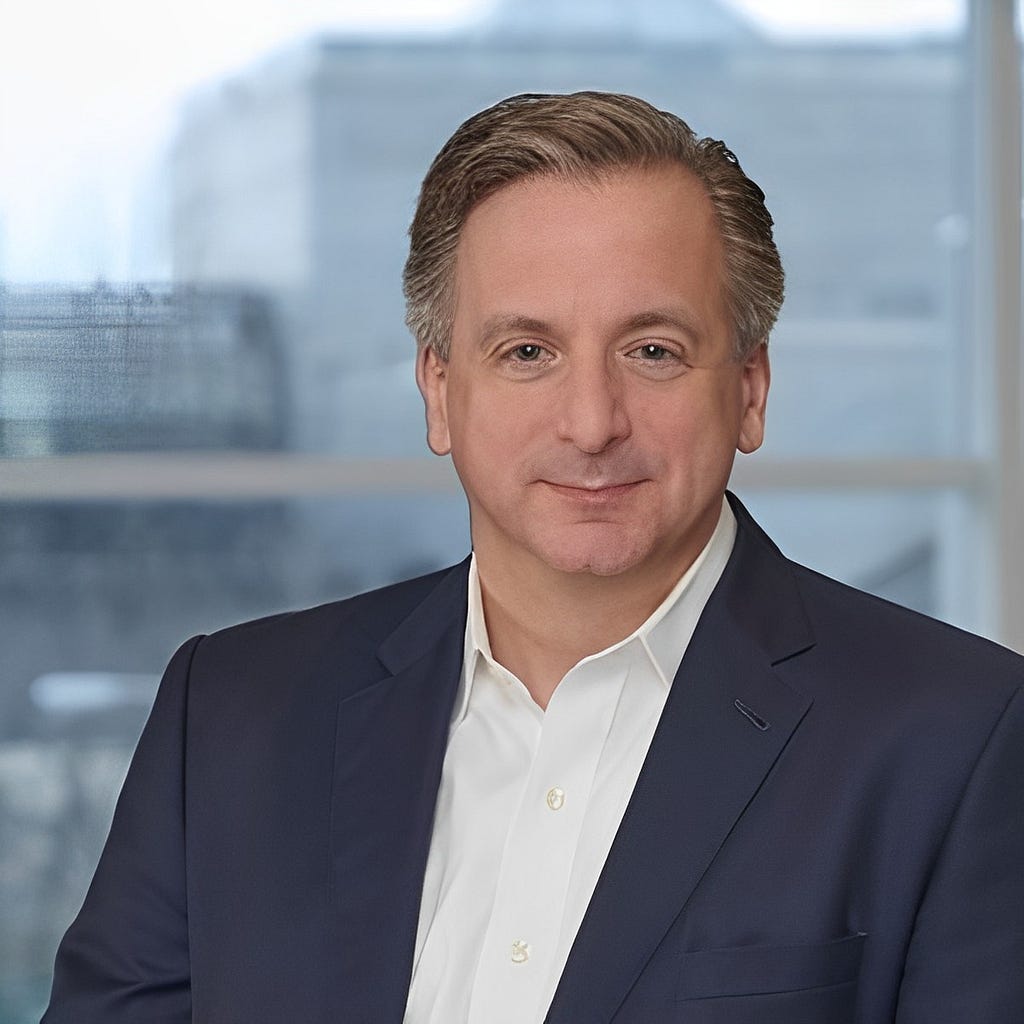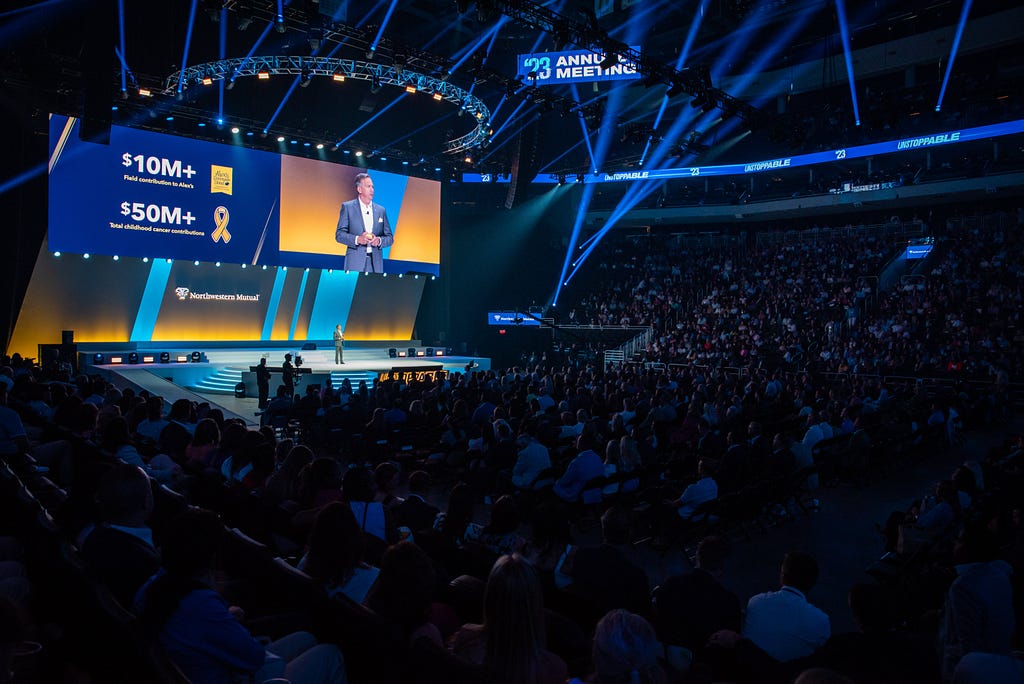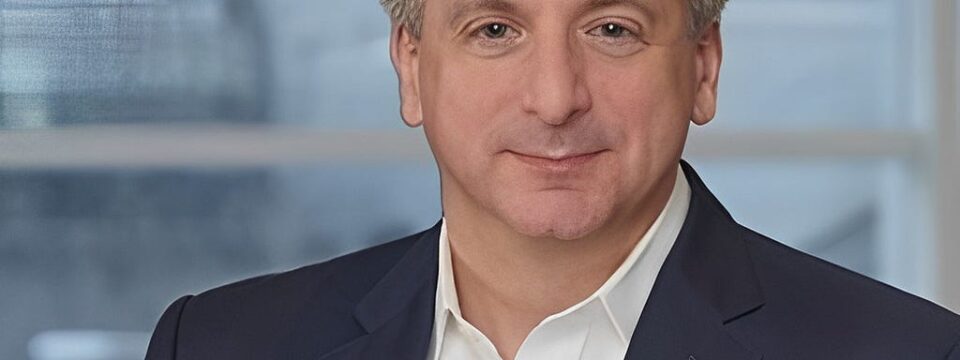
Prioritize your health and well-being. I try to exercise every morning. I do this not only to keep in shape, but to give myself a bit of quiet time to reflect, think and plan my day.
In honor of Childhood Cancer Awareness Month in September, we sat down with Steve Radke of Northwestern Mutual.
Steve Radke is vice president of government and community relations at Northwestern Mutual. In his role, Radke serves as president of the Northwestern Mutual Foundation, which focuses on developing relationships with community partners and implementing charitable strategies that create sustained community impact. He also leads the company’s lobbying and public policy formation efforts by building relationships with federal, state and local representatives and advocating for legislative and regulatory proposals that create greater opportunity for the company and its clients.
Thank you so much for joining us in this interview series! Can you tell us a story about what brought you to this specific career path and point in your life?
My journey to Northwestern Mutual began when I was living in DC and working on Capitol Hill. I was thinking about returning to my hometown of Milwaukee and went to the Library of Congress to look up, “best places to work.” Northwestern Mutual was one of three companies in the city that made the list, so I reached out to a few people that I knew worked there to tell me a little more about the company and its purpose. I was so impressed that I offered to help their Government Relations team work on a short-term project for free! That was over 25 years ago, and I’ve never regretted that decision.
More recently, our CEO asked me to also lead our strategic philanthropy and community relations efforts. I joke that after so many years of working with politicians he felt I needed a shot at redemption.
But in reality, our work on public policy and our strategic philanthropy have a lot in common. Both areas involve trying to tackle some of the most vexing challenges facing the company. Whether it is trying to impact tax law, insurance regulatory proposals, making sure students in Milwaukee have access to a quality education or trying to find better treatments or cures for childhood cancer, all of these efforts require us to be outside the walls of Northwestern Mutual, listening, learning, building coalitions and leading the change.
Can you share the most interesting story that happened to you since you began leading your company or organization?
In my 25+ years at Northwestern Mutual, I’ve had the opportunity to work on and lead a variety of interesting projects and meet plenty of fascinating people.
Two projects, which have similar outcomes, that stick out to me are related to our building redevelopment projects for our downtown Milwaukee campus that serves as home base to our more than 6,000 employees that live here. The first project being the Tower and Commons, a state-of-the-art 32-story tower completed in 2017, and the second our North Office Building Modernization project where teams are preparing to break ground in the coming months. Both investments are large in scope and share a vision of being a world-class campus that offer our employees the best amenities and environment possible for all of our stakeholders that use the space — employees, the community and our financial advisors.
These two projects I care deeply for, because they have involved not just my team, but a plethora of teams across the enterprise, from HR to Law to Communications, to outside the company working with municipal stakeholders, architects, contractors and community partners. I’m most proud of this element because in working with various vendors and contractors, we’ve been able to engage local small businesses to work on the construction, with a focus on minority-owned, women-owned, and military-veteran-owned businesses. We committed to this when constructing the Tower & Commons back in 2012and exceeded our goals for minority-owned contractors. We want to do the same with our current North Office Building modernization project.
Not only has this company pushed me out of my comfort zone in terms of dabbling in the financial services industry, but now I can add, “headquarter renovations” to my resume as well!
It has been said that our mistakes can be our greatest teachers. Can you share a story about the funniest mistake you made when you were first starting? Can you tell us what lesson you learned from that?
Until recently, my entire career revolved around public policy. So leading Northwestern Mutual’s philanthropic foundation presented an opportunity for me to be exposed to and learn about a whole new world of issues. One of those is our commitment to battling childhood cancer.
For 10 years, Northwestern Mutual has been the presenting sponsor of a pediatric cancer symposium led by Children’s Hospital of Wisconsin in Milwaukee. This symposium brings together some of the top cancer researchers in the nation, and I was asked to say a few words to kick off the event last year. In reviewing the agenda for the meeting, I noticed that part of the program was a “poster session.” I really thought — “oh, this must be fun diversion where they come up with clever graphic with superheroes or something to help boost the spirits of kids with cancer.” So, I kept asking when I’d have a chance to see the posters. Little did I know that at scientific conferences a “poster session” is where researchers present very detailed summaries of their peer-reviewed research in poster form — think of it like a science fair for PhDs!
This total misunderstanding humbled me a bit and reminded me that regardless of how smart or accomplished you think you might be, there is always more to learn and new areas to explore and understand. It reinforced for me the need to always be a lifelong learner!
Can you describe how you or your organization is making a significant social impact?
Northwestern Mutual’s value proposition is to help relieve Americans of financial anxiety, and our mission is to positively impact our broader society. We strive to act as world-class citizens to make lasting societal impact in our communities through the work of our Foundation.
Our efforts are national and local in scope. We believe that when everyone has the opportunity to achieve their full potential that we all succeed. We collaborate with community partners and promote volunteerism to improve outcomes in our areas of focus which include fighting childhood cancer, improving education, revitalizing neighborhoods and helping our hometown of Milwaukee flourish. Additionally, we have offices across the country with strong desires to drive impact in their communities, and part of the work we do is to empower and support those local efforts.
From a national perspective, childhood cancer research is vastly underfunded — despite being the number one cause of death by disease for children in the U.S. Over the last decade, this has become a priority for our company, and we have been committed to filling this gap through our Childhood Cancer Program. The program works to accelerate the search for better treatments and cures for childhood cancer, while supporting families undergoing treatment and survivors struggling with late term effects. In the last decade, the program has contributed nearly $50 million to the cause and funded more than 600,000 hours of research. We take pride in knowing there are kids today who are cancer-free thanks to the research we have funded.
On top of that, we also offer two different scholarships through the Northwestern Mutual Foundation: one for childhood cancer survivors and one for siblings of those affected by childhood cancer. In its first two years, I’m proud to say that our scholarship program awarded more than 200 recipients across the country to help survivors and siblings, pursue their dreams. It’s programs like this that really shows the impact that we are making on kids and their families.
Can you tell us a story about a particular individual who was impacted or helped by your cause?
I had the opportunity to meet, and eventually work with, a girl named Samantha Sowa who in 2010 at the young age of 11 was diagnosed with papillary thyroid carcinoma — a cancer rarely found in children at the time. She faced her battle and after many treatments, thankfully ended up beating cancer about a year after her diagnosis.
Throughout her treatments and after, she noticed a chasm in how childhood cancer research was funded compared to other cancers. So, she took it upon herself to research the root causes of this and pinpoint ways in which organizations can help increase and maximize funds to the cause.
Samantha is inspiring on many levels. Not only has she beat cancer and found ways to highlight the gap left by government funding for childhood cancer research, but she also is a first-generation college student who’s had much success in her career. We are lucky enough that Samantha had even decided to join Northwestern Mutual as an intern a few years ago and eventually as a full-time employee.
Here is a link: Samantha Sowa: Scar Stories: Fundraising for Cancer | TED Talk
Here is a link to her LinkedIn profile: (15) Samantha Sowa | LinkedIn
Are there three things the community/society/politicians can do to help you address the root of the problem you are trying to solve?
Working to end childhood cancer is our company-wide goal — but we know our ability to create tangible social change extends beyond any one initiative. At the core of our efforts, we understand the power of collaboration and the opportunities that can arise when we work together.
There are many ways to get involved, I’d encourage everyone to join the fight against childhood cancer in a way that is meaningful to them.
Some ways to get involved include:
Donate or volunteer with local and national organizations. We’re longstanding partners with Alex’s Lemonade Stand Foundation (ALSF) because of their strong focus on research and finding cures, and our local offices across the country have rallied behind them to support efforts through fundraising events and volunteerism.
Incentivize and prioritize pediatric cancer funding. While equally important, adult-aged cancers tend to be more profitable. We want to level the playing field to ensure our future generations are receiving the funds and care they deeply need.
Encourage support for psychosocial programming. Going through cancer is not only hard for children and their families in the physical sense — they need to feel supported in other ways. That’s one of the reasons we started our Childhood Cancer Scholarship Program for survivors and their siblings to instill hope.
Are you working on any new or exciting projects now? How do you think this might help people?
The Northwestern Mutual Foundation supports multiple causes and initiatives to help lead to better outcomes for our communities.
Through Alex’s Lemonade Stand Foundation, we’ve been able to support young scientists making strides in developing treatments and cures for childhood cancer patients by issuing grants to directly fuel their research. This is the perfect blend to not only work bolster advancements in treatment, but set up early career researchers, such as postdoctoral or clinical fellows, for success. A mentor is required, and a career development plan must be included. In the coming months, we’ll have a new cohort of talented young scientists who we’ll be helping to support.
We’ve also recently announced further funding to our broader education portfolio, which we’ve invested more than $60 million in over the past 25 years. Over the next five years, we will issue more than $2.5 million in grants and scholarships to 136 students from local, high-performing schools wishing to pursue higher education through our newly formed HBCU Connection Scholarship program and partnership with All-In Milwaukee.
Additionally, we’ve put a stake in the ground for more affordable housing in the city of Milwaukee, recently committing $3 million towards this effort through our partners. Homeownership is strongly tied to economic empowerment, financial security and community development and we firmly believe that helping residents access fair and sustained homeownership opportunities is an important means to helping close the racial wealth gap.
We are thrilled to know that our investments are directly making an impact on students in Milwaukee and opening the door for many to receive an education that will provide them with the foundation for long-term career success.
What you are doing is not easy. What inspires you to keep moving forward?
To be a world-class corporate citizen suggests that we have no greater responsibility than to be a force for good. We know that the decisions we make have a ripple effect on our clients and our communities. We have an opportunity to lead by example — to not only dedicate our time and resources to impactful causes, but to encourage other organizations to join us along the way.
Being in the position that I am, I am grateful and inspired seeing firsthand the smiles on kids and their families faces when they receive a scholarship, or a room makeover, or better yet, good news from their doctors. Knowing our efforts are making a difference is something you cannot put a price tag on.

What are your “5 things I wish someone told me when I first started” and why?
No one can achieve success alone. Acknowledge that others (and a bit of luck) are important parts of your success. Express gratitude to those who help you. Verbal, intentional recognition makes people feel seen and valued.
Allow yourself the luxury of an unexpressed thought. I learned this one in law school. There were some classmates who always needed to chime in on every issue, and raise an argument just for the fun of it. These folks didn’t make many friends and rarely impressed anyone with their insights. I always think it is a better approach to be a careful listener and speak with you can make a meaningful contribution to the dialogue. As the old saying goes, “you have two ears and one mouth…use them proportionately.”
Sometimes the hardest thing to do is nothing. This was a credo one of my former bosses instilled in me. As leaders, most of us are pre-disposed to action. When we see something we don’t like, our natural reaction is to do something. But sometimes the best — and hardest — thing to do is nothing.
Prioritize your health and well-being. I try to exercise every morning. I do this not only to keep in shape, but to give myself a bit of quiet time to reflect, think and plan my day.
You will not encounter nearly as much quicksand or occasions to “stop, drop and roll” as your childhood prepared you for. Sure, things keep us up at night that we search for quick and easy solves for but taking the time to assess and bringing in the right folks almost always serves us best.
You are a person of enormous influence. If you could inspire a movement that would bring the most amount of good to the most amount of people, what would that be? You never know what your idea can trigger. 🙂
While we have an integral focus on childhood cancer, future generations more broadly are at the core of much of our other initiatives — from education, housing and making Milwaukee, Wisconsin a great place to live and work for years to come. And we believe that by focusing on those areas, we’re helping young people and families achieve their dreams by not letting finances get in the way.
Young people are our future and everything that we can do to make sure that they are set up with the right tools and resources is a win.
Can you please give us your favorite “Life Lesson Quote”? Can you share how that was relevant to you in your life?
Harry Truman once said, “It’s amazing what you can accomplish if you do not care who gets the credit.” As I mentioned earlier, to do anything great in life, you need a great team. And this requires a collective mindset and empowering those around you.
Is there a person in the world, or in the US with whom you would like to have a private breakfast or lunch with, and why? He or she might just see this, especially if we tag them. 🙂
I am fascinated by explorers — people with the courage to go to unknown places, learn about them, and advance human knowledge. There are probably no more courageous (and ridiculously smart) explorers than astronauts, so I would love to have a chance to spend time with one of them to learn more about the experience of traveling into space. If I had to pick one in particular, I would choose Chris Hadfield, who not only was the commander of the International Space Station but made a video signing David Bowie’s “Space Oddity” while on the space station that has been viewed over 50 million times!
How can our readers further follow your work online?
I’d encourage you to check out Northwestern Mutual Foundation’s website at https://northwesternmutual-foundation.com/ and connect with me on LinkedIn.
This was very meaningful, thank you so much. We wish you only continued success in your great work!
Social Impact Heroes: Why & How Steve Radke of Northwestern Mutual Is Helping To Change Our World was originally published in Authority Magazine on Medium, where people are continuing the conversation by highlighting and responding to this story.
